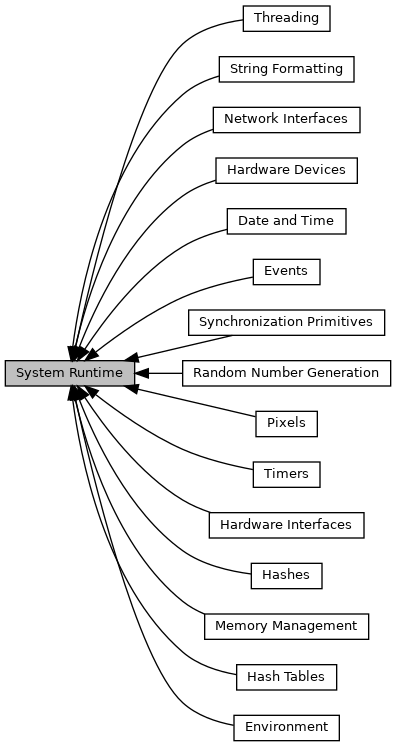The "system runtime" layer provides low-level functionality specific to the platform. More...

|
Modules | |
| Date and Time | |
| Methods for manipulating time and date. | |
| Environment | |
| System methods for reading information about the environment. | |
| Events | |
| Defines event queue functionality for producer/consumer patterns. | |
| Hashes | |
| Methods for hash generation, sometimes with hardware acceleration. | |
| Hash Tables | |
| Methods for hash table creation, insertion, deletion, and lookup. | |
| Memory Management | |
| Functions for managing and manipulating memory. | |
| String Formatting | |
| Methods for creating and outputting formatted strings. | |
| Random Number Generation | |
| System methods for generating random numbers, sometimes using hardware to provide better entropy. | |
| Synchronization Primitives | |
| Implements various synchronization methods for thread-safe operations. | |
| Threading | |
| Managing threads and program execution. | |
| Timers | |
| Periodic and one-shot timers for scheduling tasks. | |
| Pixels | |
| Managing pixel data, framebuffers, and drawing operations. | |
| Hardware Interfaces | |
| Managing hardware resources, peripherals, and low-level operations. | |
| File System Runtime | |
| High–level API wrapping an underlying littlefs-based implementation that can operate either purely in RAM, Flash or backed by a host file (persisted across runs). | |
| Network Interfaces | |
| Managing network resources, protocols, and low-level operations. | |
| Hardware Devices | |
| Drivers for external hardware devices. | |
Macros | |
| #define | sys_assert(condition) |
| Asserts that a condition is true. More... | |
Functions | |
| void | sys_init (void) |
| Initializes the system on startup. More... | |
| void | sys_exit (void) |
| Cleans up the system on shutdown. More... | |
Detailed Description
The "system runtime" layer provides low-level functionality specific to the platform.
The system runtime includes memory, process and thread management, synchronization primitives, hashes, string formatting, random numbers and timers. When developing for a new platform, you will need to implement the functions in these modules. The implementation will depend on the specific platform's capabilities and requirements.
When using this module, you should include this header file and link against the appropriate implementation for your platform. In your entrypoint file, you should call sys_init() to initialize the system, and sys_exit() to clean up resources before exiting.
There is a set of tests that can be run to verify the functionality of the system runtime. These tests can be found in the tests directory.
Macro Definition Documentation
◆ sys_assert
| #define sys_assert | ( | condition | ) |
Asserts that a condition is true.
- Parameters
-
condition The condition to check.
If the condition is false, it will call panicf with an assertion failure message, including the condition, file name, and line number.
- Examples:
- examples/Network/ntp/main.m.
Function Documentation
◆ sys_exit()
| void sys_exit | ( | void | ) |
Cleans up the system on shutdown.
This function should be called at the end of the program to perform any necessary cleanup tasks, such as releasing resources and shutting down subsystems. It prepares the system for termination.
◆ sys_init()
| void sys_init | ( | void | ) |
Initializes the system on startup.
This function must be called at the start of the program to initialize the system environment, including standard input/output streams and any necessary subsystems. It prepares the system for normal operation. It may include platform-specific initialization steps.